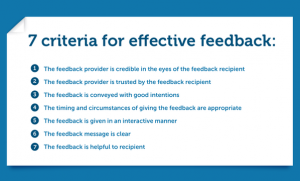Giving and receiving feedback is an under-rated aspect of mental health and plays a very important role in our lives. At work, at home and in our various relationships we have all encountered times when we have not been happy with how someone has treated us, or how someone has given us feedback, whether it has hurt us or has crippled us. Was the feedback you received or gave, constructive? This is the key to effective communication!
People react to feedback in different ways. Responses to feedback are dependent on many factors, for example; mood, past experiences, upbringing, biology, genetics. Our perceptions and beliefs about ourselves and other people, which are developed over time and influenced by the aforementioned factors, can in turn influence how we respond to feedback.
It is a natural human response to become defensive when we feel as though we are being given negative feedback. Sometimes, being on the defence can hinder us. We do not have the opportunity of growth and learning if we continually disregard feedback. Furthermore, if we approach a situation in a defensive manner, in a blaming manner, what is our likely response going to be? Most likely, something similar to how we approached the situation. This can often lead to escalation of the problem and non-constructive problem solving.
Different types of feedback are appropriate for different contexts. For example, in a work context, it would be important to make sure giving and receiving feedback is conducted in a professional, depersonalised manner. In close relationships, it is naturally more personal and can sometimes be tricky to navigate because of this. In either context however, some boundaries can be crossed and it is important to be open as well as be assertive. When we experience strong feelings toward certain people and situations it can be difficult to detach from the consuming emotions, and this can also make giving and receiving feedback a hard task. Below are some tips for giving and receiving feedback in both contexts.
The do’s of receiving feedback
- Be open to feedback as much as you can, but try not to take feedback too personally which flows into:
- Be aware of our own perceptions, biases and styles of thinking that may influence how we perceive feedback
- Try not to react to the initial sting of negative feedback
- Keep silent and listen carefully
- Try to take feedback as a learning opportunity and movement forward
The do’s of giving feedback
- Be aware of our own perceptions and styles of thinking that may influence the situation (e.g. are we more interested in being liked? Have we read the situation as realistically and fairly as possible?)
- Point out strengths as well as areas to improve
- Make feedback clear and be assertive
- Allow time for a response to feedback
- Be prepared to accept feedback yourself
- Try to stick with feedback regarding a person’s behaviour rather than making assumptions about personality or why a person may have behaved a certain way
- Be sensitive and convey feedback with good intentions
AUTHOR: Danica Adolfsson
Danica is a registered Psychologist with the Australian Health Practitioner Regulation Agency. Danica’s has worked with diverse populations in a variety of settings. This includes work in drug and alcohol rehabilitation, a university clinic, Community Mental Health, Aboriginal and Torres Strait Islander Health, Headspace, and the Conduct Disorder Program which involved home visiting families and their youths who were experiencing emotional and behavioural concerns.
Danica is passionate about helping those of all ages who experience difficulty managing mental health concerns, assisting and supporting them to achieve good health and wellbeing. Danica has a particular interest in working with adults and young people on issues relating to: Mood disorders, Anxiety Disorders, Psychotic Disorders, Eating Disorders, Trauma and Stress related Disorders, Behavioural Disorders.

